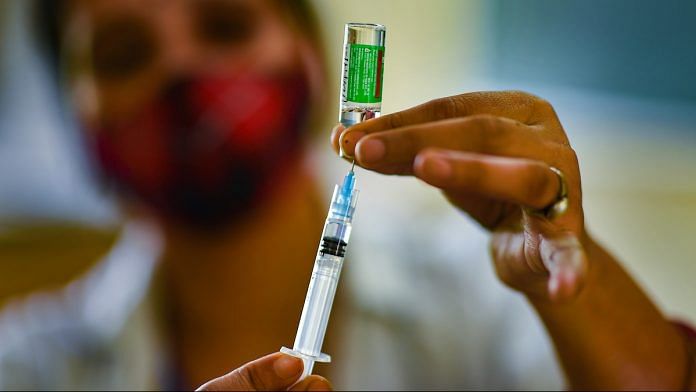New Delhi: Both Covishield and Bharat Biotech’s Covaxin produce a “good immune response” but the AstraZeneca Covid-19 vaccine shows “significantly higher” seropositivity rate and anti-spike antibody titre, a new study by Indian doctors has found.
The study, which has not yet been peer reviewed and was published in Medrxiv on 2 June, observed immune responses in 515 healthcare workers and found that 95 per cent showed seropositivity after the two doses of both vaccines.
“Of the 425 Covishield and 90 Covaxin recipients, 98.1% and 80.0% respectively, showed seropositivity,” said the study, adding that the “median interquartile rise” in anti-spike antibodies was also “significantly higher in Covishield vs Covaxin recipient” at 127 AU/mL and 53.0 AU/mL respectively.
Seropositivity refers to the production of antibodies in an individual, and the titre refers to the amount of the antibodies produced.
The study went on to compare the post-vaccination immune responses of all participants with those who had a history of Covid-19, and those who didn’t. It found that participants who had recovered from Covid-19 at least six weeks before the first dose, and took both shots, were 100 per cent sero positive and had higher antibody titres, too.
“Both vaccines showed good and similar immune responses even after a single dose in people who already had Covid in the past. This suggests both vaccines work well,” said Awadhesh Kumar Singh, lead author of the study and consultant endocrinologist, G.D. Hospital and Diabetes Institute, Kolkata.
“It, however, appears that Covishield may have a greater ability to produce more anti spike antibodies and higher seropositivity rate,” he added. “We could also produce some real world evidence to show that Covaxin induces good protective antibodies after the two doses in the absence of published Phase 3 data at the moment. Covishield has already published its Phase 3 data.”
On whether the study measured vaccine efficacy beyond antibodies, the lead author told ThePrint: “While this study adds to evidence, in the absence of measuring more specific neutralising antibody and other cell mediated immunity response — it is difficult to comment whether one is superior to other. Only randomised head to head trial can conclude anything.”
Also read: Modi govt policy not effective enough, Covid vaccine must be free for all, ICMR researchers say
The study
The study involved 515 healthcare workers from 13 states and 22 cities, 305 male of whom were male.
Anti-spike antibody titres were measured at four time points — Day 21 after the first dose until the day before the second dose; days 21-28 of second dose; three months and finally six months after the second dose.
Apart from finding a higher seropositivity among Covishield recipients, it found that seropositivity rate was “significantly more” in participants with an age of 60 or less compared to those above 60.
“Amongst the captured co-morbidities, people with T2DM (type 2 diabetes) had a significantly lower seropositivity rate compared to those without in overall cohort, and this was consistent in both Covishield and Covaxin recipients,” the study said.
Similarly, the “median interquartile range” of anti-spike antibody titres were “significantly higher in Covishield recipients compared to Covaxin”. Women were found to have nine per cent greater antibody titres compared to men.
Notably, the study found that “the past history of SARS-CoV-2 infection elicited a significantly greater median antibody titre, compared to SARS-CoV-2 naïve cohorts, irrespective of the type of vaccine received”.
In other words, people with a past history of Covid-19, who had taken both shots of the vaccine, had the highest antibody titres compared to those without a history of infection.
According to the study, across all 515 participants, Covishield produced a seropositivity rate of 98 per cent, and Covaxin of 80 per cent, with antibody titres of 127 AU/mL and 53.0 AU/mL each. The combined seropositivity of both vaccines after both doses was 95 per cent.
For those without a history of Covid-19, the seropositivity of Covishield was 97.8 per cent and Covaxin 79.3 per cent. The corresponding anti-spike antibody titres were 115.0 AU/mL and 20.0 AU/mL.
But the greatest difference is among those who had recovered from Covid-19 more than six weeks before the first dose. According to the data, the seropositivity was 100 per cent across both vaccines for this group, and the antibody titres produced were as high as 400.0 AU/mL for Covishield and 308.0 AU/mL for Covaxin.
“We found presence of co-morbidity, sex, vaccine type and past history of COVID-19 infection as independent predictors of antibody titre,” the paper reads.
Breakthrough infections
A total of 30 participants (6.1 per cent), without a history of past infection, reported contracting Covid-19 after having taken at least one shot of either vaccine. For 27 of them, it occured after the second dose.
“Majority had mild (28/30) to moderate (2/30) COVID-19 infections and all recovered. None of the cohort who had Covid-19 following either vaccine had severe Covid requiring mechanical ventilation,” the study said.
The study concludes by saying that both vaccines are found to produce a good immune response, and “whether any real difference in inducing immunogenicity exists between two vaccines can only be meaningfully demonstrated through a head-to-head RCT (randomised control trial).”
Others involved in the study include Sanjeev Ratnakar Phatak, consultant physician and diabetologist, Vijayratna Diabetes Centre, Ahmedabad; Ritu Singh, consultant gynaecologist, GD Hospital and Diabetes Institute, Kolkata; Kingshuk Bhattacharjee independent biostatistician, Kolkata; Nagendra Kumar Singh director, Diabetes and Heart Research Centre, Dhanbad; Arvind Gupta, head, department of diabetes, Obesity and Metabolic Disorders, Rajasthan Hospital, Jaipur; and Arvind Sharma, associate professor, department of community medicine, Mahatma Gandhi Medical College and Hospital, Jaipur.
(Edited by Arun Prashanth)
Also read: Simple antibody test can help look for blood clots after Covishield vaccine, study says



